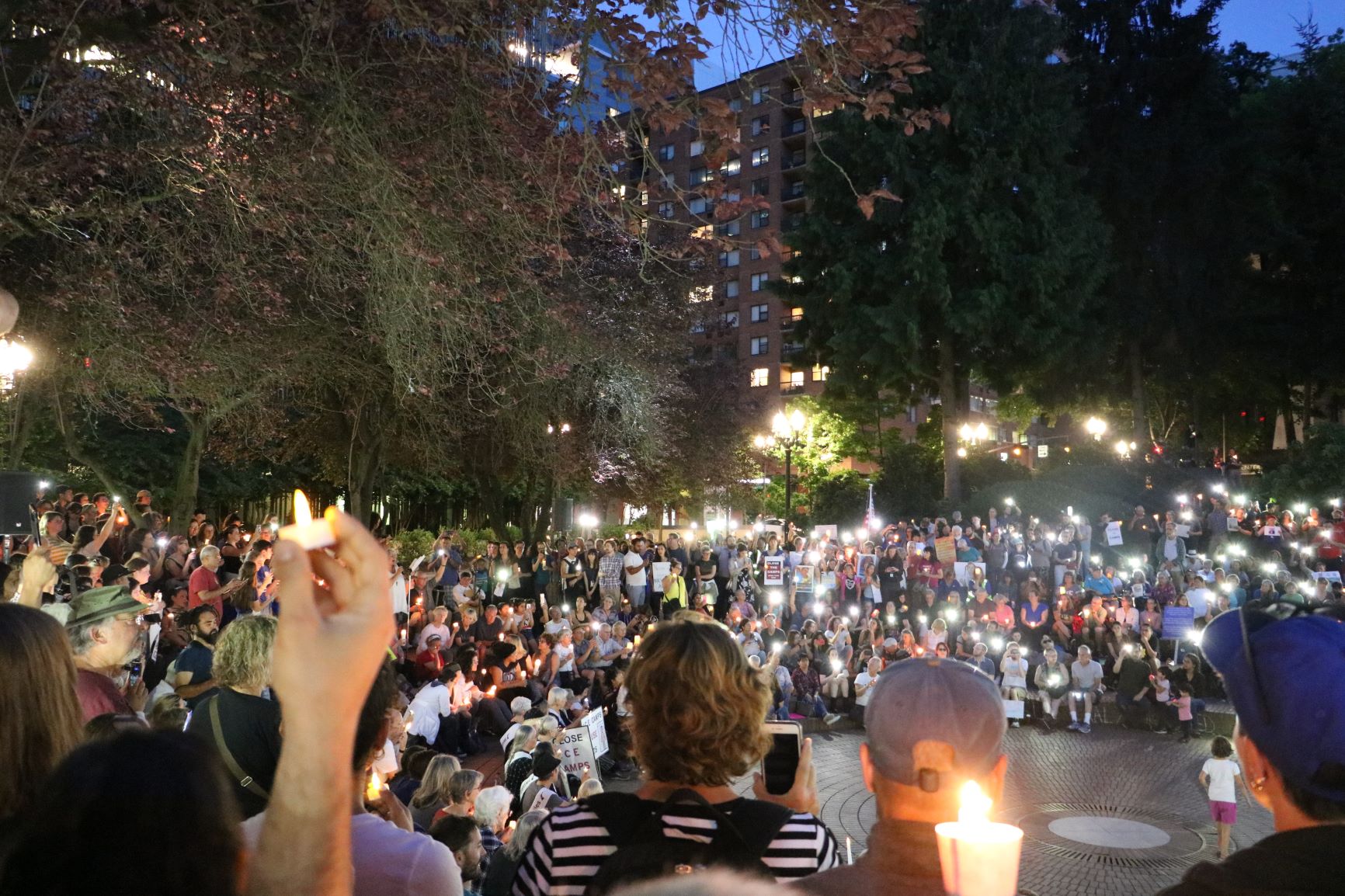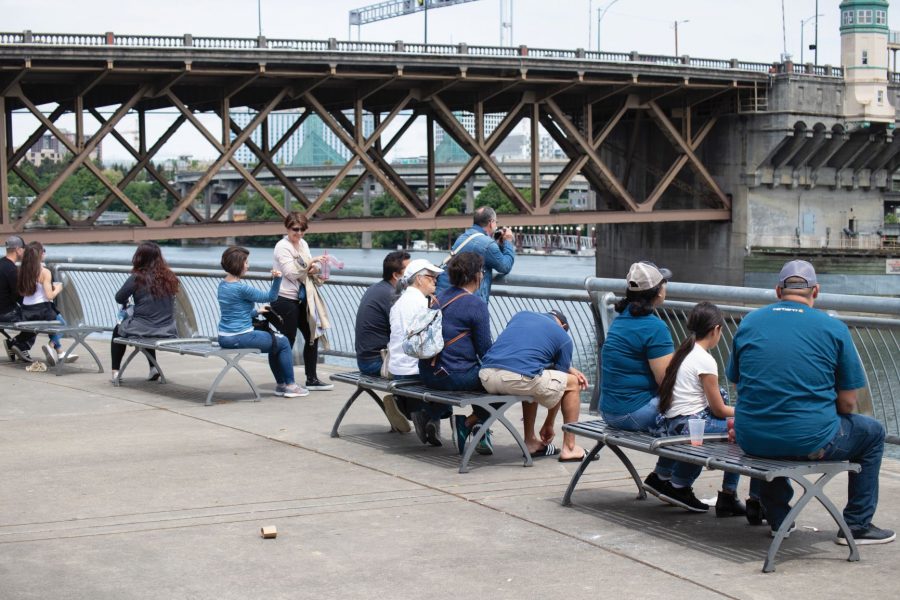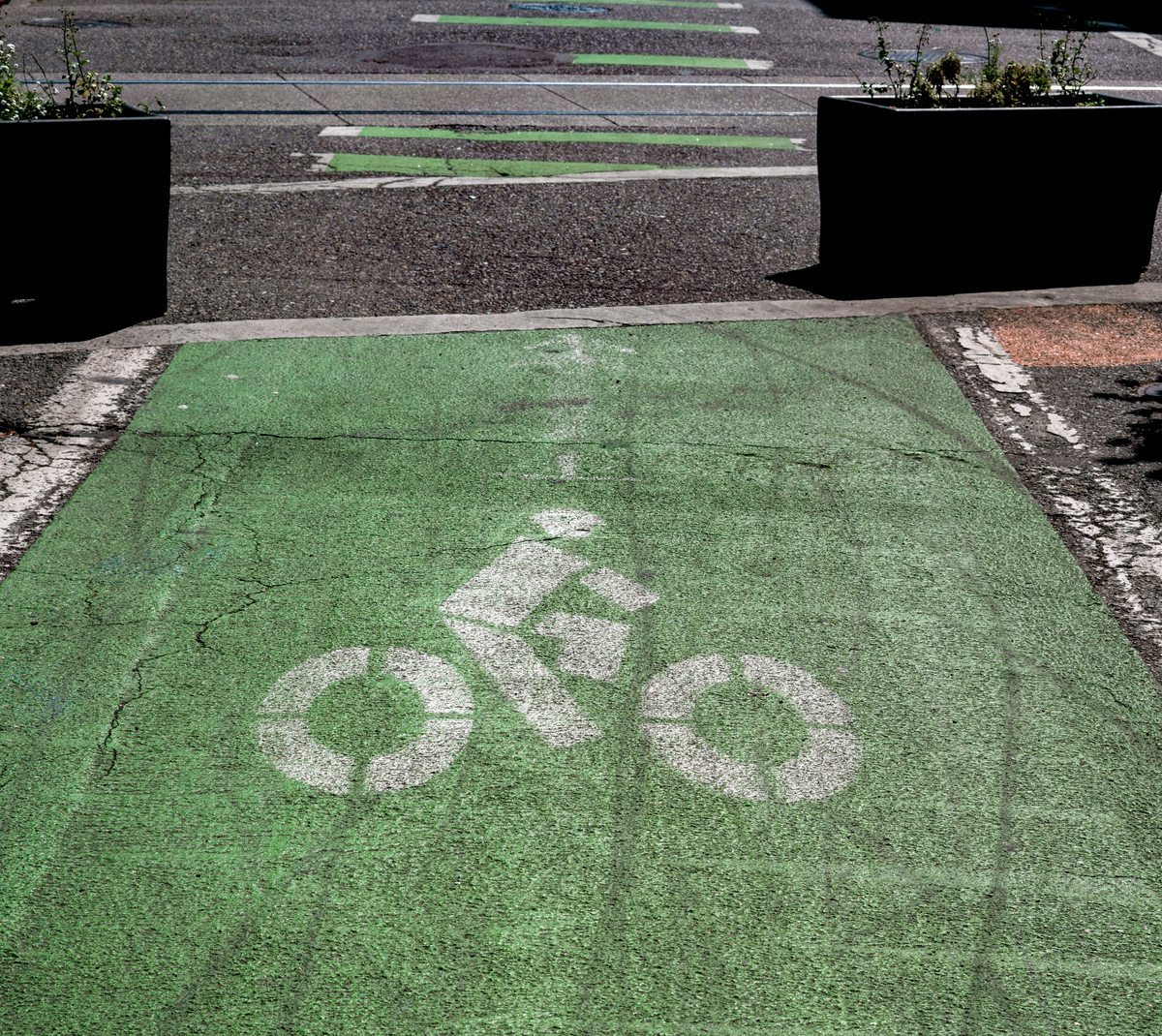Hundreds of people gathered in multiple areas on July 12 across Portland to protest inhumane conditions faced by immigrants and refugees at United States immigration detention centers. The evening protests were a part of “Lights for Liberty,” a coordinated mass protest with over 800 scheduled events in the U.S. and abroad.
Thousands of people congregated at detention camps and Immigration and Customs Enforcement facilities—as well as in the streets of cities, towns and in people’s homes across America—to hold a candlelight vigil for the children who have died in detention centers along U.S. borders over the past year, and to voice opposition to ICE and the Trump administration.
In Portland, the two largest gatherings occurred at the ICE facility on SW Macadam and the Terry D. Schrunk Plaza outside of the Portland Immigration Court downtown.
Both events drew crowds of hundreds of people and included multiple speakers and musical guests. Protesters lit their candles and turned on their flashlights and began peacefully marching through the streets of Portland and around the ICE detention center at roughly 9 p.m.
Monica Arce, co-host of Lights for Liberty in Portland, began the vigil in the Terry D. Schrunk Plaza. “Since September of 2018, six children have died while in custody,” she said. “We must demand that these concentration camps be closed, that every person seeking asylum gets their fair chance at a hearing, that every child is reunited with their parents and that every detained child gets treatment for the trauma caused by this government.”
Mistreatment at Detention Centers
The Lights for Liberty protests were put together as a result of the mistreatment of many immigrants and refugees. Multiple immigration lawyers who recently visited a detention center in Clint, Texas published an in-depth report in The New York Times about the conditions within the facility. According to their account, there was at one point thought to be over 700 children being held in the facility, which was built to hold roughly 100.
The center was intended to accommodate migrants for roughly 72 hours, but many currently housed at Clint—most of whom are children—have been there for weeks. Some children reportedly haven’t been able to shower since they arrived at the facility, and sanitation items such as soap and toothbrushes are not provided.
Elora Mukherjee, director of the Immigrants’ Rights Clinic at Columbia Law School and one of the lawyers who visited the facility in Clint, said there was “a stench” surrounding the center when she visited in June. “The overwhelming majority of children have not bathed since they crossed the border,” she said.
Migrant crossings reached a 13-year high last May after 144,200 were taken into custody at the border, but those numbers have since declined. The Trump administration has been under intense scrutiny from democrats after reports of overcrowding and inhumane conditions at detention facilities began to surface.
Border Patrol leaders have disputed the claims, saying the facilities are rigorously and humanely managed. This claim has been questioned after seven migrant children died in federal custody over the past year. No children were reported to have died while in the custody of U.S. Customs and Border Protection over the last decade until December 2018, when 7-year-old Jakelin Caal Maquin from Guatemala died from liver failure 48 hours after Border Patrol agents detained her and her father.
While many of the deaths—both of adult and children migrants at the border—may be attributed to underlying health conditions and the toll of long journeys, health professionals and advocates are criticizing the Trump administration’s immigration policies, especially keeping migrant children in custody for long periods of time where they are unable to get medical attention.
“We need more access to judges, lawyers and interpreters, not more walls and ICE,” said Monica Arse, co-host of the event. “We must demand prosecution for the policymakers directly responsible for causing this crisis. I hope tonight inspires us all to continue to take action.”
Lights for Liberty Vigil
People began to gather around 8:30 p.m. at Terry D. Schrunk Plaza. They mingled and raised their signs while Martin Luther King Jr’s speech “We Shall Overcome” was played over the loudspeaker. One sign read, “Summer Camp, Not Concentration Camp.” Another read, “Babies do not belong in cages.” The names of all the children who have died in custody, as well as words of advocacy and hope, were written in chalk on the steps of the plaza. An altar was arranged in the center upon a tapestry of a monarch butterfly, a common symbol of immigration.
After a drum ceremony performed by the Portland Raging Grannies, Arse took to the stage. “Two weeks ago, I was sitting in my call room waiting for babies to be born, and I found myself reaching a peak level of despair,” she said. “In looking for things I could do, I found there would be a nationwide effort called Lights for Liberty on July 12 and decided to host an event in Portland. I thought I would have 50 friends lighting candles here with me, and now look at this,” she gestured to the crowd of hundreds.
Arse then brought Leslie Salazar, a lead community health worker at the Oregon Latino Health Coalition and immigrant from Guatemala, on the stage. “Many years ago, I was one of those kids on the border detained by immigration,” Salazar said. “I was detained by immigration for 40 days.”
Salazar helps migrant families apply for medical insurance. When she first came to Oregon almost 50 years ago, she was flagged to be deported. “But because of people like you,” she said, pointing to the crowd, “I was able to fight, I was able to fight for many, many years. And after 50 years, I was able to get my American citizenship.”
“Together we can fight, and together we can make this possible.”
Up next on the stage were Francisco Rodriguez and Cameron Coval, co-founders of Pueblo Unido PDX, a nonprofit organization that provides Portland metro community members facing deportation with legal representation and other forms of assistance they may need.
In March of 2017, Rodriguez was the first DACA—Deferred Action for Childhood Arrivals—recipient in Oregon to be detained by ICE. DACA is a program implemented by former President Barack Obama, which temporarily grants its recipients—young immigrants who were brought to the U.S. illegally as children—protection from deportation. The Trump administration attempted to end DACA in 2017, but federal judges ruled major elements of the program must remain in place as the program is legally evaluated.
Rodriguez said in order for him to get released from detention, “it took a hundred people to protest outside the ICE facility, and it took a hundred more people to call into ICE to demand my release,” he said. “All those calls flooded their phone lines, and they wanted me to get out of there as soon as possible.”
“If we were able to accomplish all of that just by hundreds of people, I’m looking around right now and we got numbers to do a lot more than just that.”
After being released, Rodriguez said he saw people in his own community being affected by ICE like he was but who weren’t receiving the same kind of help he did. This discrepancy inspired him to help start Pueblo Unido PDX to help those who had been detained but didn’t have the means to get the help they needed.
According to Cameron Coval, the other co-founder of Pueblo Unido PDX, “legal representation is the most predictive factor in whether someone will win their case against deportation.” He continued, “Unfortunately, legal representation is very expensive, particularly for removal defense, even more so for removal defense while somebody is detained.”
“Since April 2017, when we formed Pueblo Unido, we’ve worked with over 130 people in detention, provided over 100 consultations for free for people in detention, helped hire 18 attorneys for people in detention, provided communication credits to over 100 people in detention,” Coval said. “And what that means in practice—because of supporters like y’all, who give us money and enable us to do that work—14 people have been released from detention and reunited with their families. And two have already won their cases against deportation and became permanent residents.”
“But we need y’all now more than ever. It’s not over. It’s really, really not over.”
After the speakers concluded, everyone chanted “never again is now!” before a moment of silence was held. Then singer/songwriter Beth Hamon serenaded the marchers as they left the plaza.
The protest remained peaceful and quiet throughout. The marchers remained on the sidewalks and obeyed traffic laws. There was no chanting or shouting. Many cars honked as they drove past the vigil, some holding their fists out of their windows in a show of solidarity.
After the march crossed the Hawthorne Bridge, participants were handed a card with a list of 10 action items they can take on behalf of detainees at the border. The march then disbanded at Tom McCall Waterfront Park.
ICE Raids
The Trump administration announced ICE will begin extensive nationwide raids on July 14 in an effort to arrest thousands of members of undocumented families. Officials say ICE is targeting at least 2,000 immigrants who have been ordered deported and that ICE’s goal is to deport them as quickly as possible.
President Donald Trump has also been pushing to include a citizenship question on the U.S. 2020 census, but the Supreme Court recently rebuked the administration’s ability to do so. Trump has since stated he will seek to gather citizenship information from existing records.
Coval, speaking about the raids, said, “Please help, be good arbiters of information to the community, don’t stoke fear. That is certainly the intention of the government and of ICE—to scare as many people as possible. There is ramped-up enforcement perhaps for people who have already been ordered removed, but for other people it’s essentially business as usual with an increased attention on people who have orders.”
“That’s to say, help people in the community understand their rights and assert their rights.”
Portland is a sanctuary city, which means Portland Public Police are not required to enforce federal immigration laws. Portland State is also considered a sanctuary campus, which means PSU faculty, staff and students are not required to consent to immigration enforcement activities on campus or provide confidential student information.
PSU Interim President Stephen Percy recently declared PSU’s commitment to undocumented and DACA students. There are plans to build a Dream Center at PSU that will provide undocumented students with resources, financial aid, legal and holistic support, as well as a sense of community.
“We want to do everything we can at PSU to make all of our students feel welcome and supported, regardless of their national origin or immigration status,” Percy stated. “You belong at PSU.”
Lights of Liberty was sponsored by multiple organizations, including Pueblo Unido PDX, CAUSA, Nasty Women Get Shit Done, Oregon Latino Health Coalition, Virginia Garcia Memorial Health Center, Stand in Every Corner PDX, Children First for Oregon, Portland Democratic Socialists, Oregon Nikkei Endowment, Portland Women’s March, Multnomah Democrats, National Organization for Women (NOW)- Oregon, El Programa Hispano Católico, IRCO (Immigrant & Refugee Community Organization), and the Portland Japanese American Citizens League (JACL)






